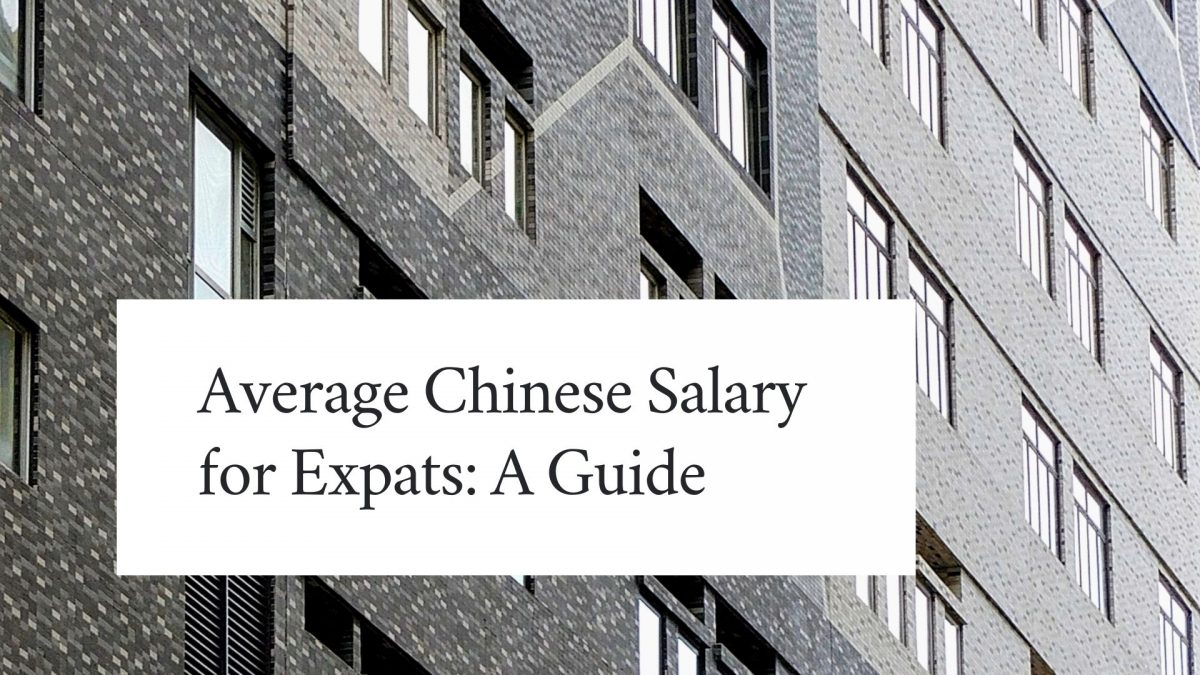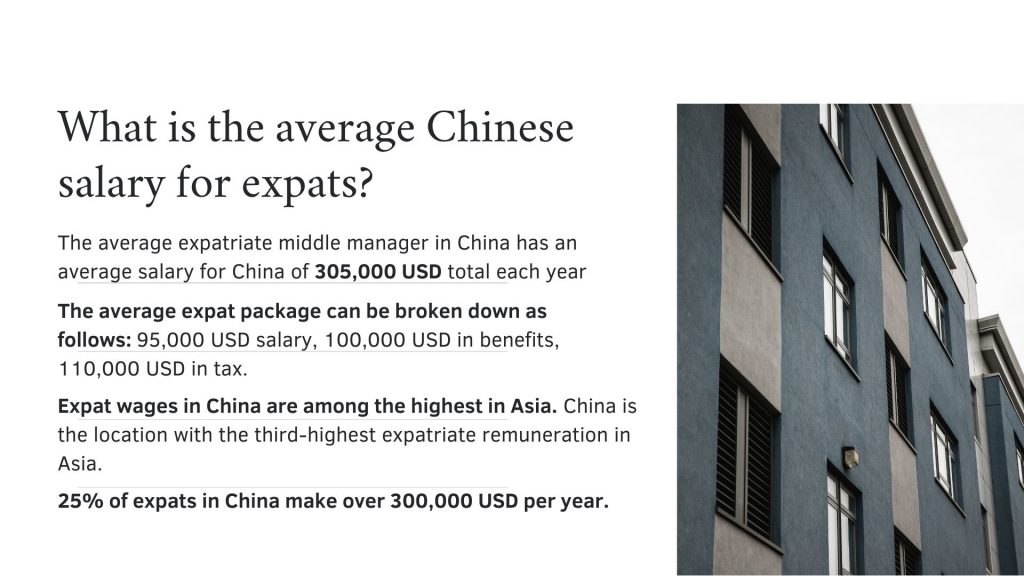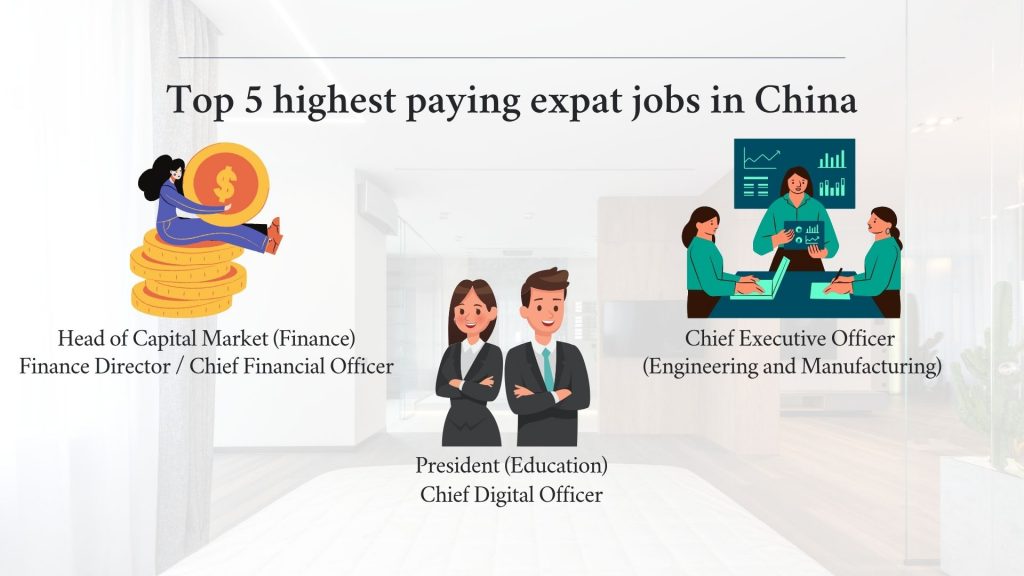
Are you considering a move to work in China? This guide is set out to uncover the average Chinese salary for expats and the factors influencing them. Expat packages in China often include non-cash benefits and perks that represent more than half of the total package. From the top 5 highest paying expat jobs in China, to other factors that influence remuneration such as location and experience, join us as we demystify the world of expat employment in China. Let’s dive in!
What is the average Chinese salary for expats?
When it comes to the average Chinese salary for expats, the figures often paint a lucrative picture. So, how much do expats in China get paid on average? What additional benefits and perks can be expected when moving to China for work?
- The average expatriate middle manager in China has an average salary for China of 305,000 USD total each year, including tax and benefits. Typical benefits include housing allowances, health insurance, and education subsidies.
- The average expat package can be broken down as follows: 95,000 USD salary, 100,000 USD in benefits, 110,000 USD in tax. While the gross salary alone may seem impressive, it’s important to consider the impact of taxes and benefits.
- Expat wages in China are among the highest in Asia. China is the location with the third-highest expatriate remuneration in Asia. Despite a drop in the number of expats since the Covid-19 pandemic, there are still great opportunities to carve out a successful career move to China!
- 25% of expats in China make over 300,000 USD per year. This shows the substantial earning potential for skilled professionals and executives in China.
- In most cases, non-cash benefits and tax represent more than half the total expatriate package. Beyond the headline salary, non-cash benefits like housing, schooling, and healthcare play a significant role in expatriate compensation.

Factors influencing the average Chinese salary for expats
When it comes to determining the average Chinese salary for expats, several factors come into play, shaping the compensation packages offered to foreign workers. Here are some key points to consider:
- Location. The city or region where you work can significantly impact your salary and benefits. Major cities like Shanghai and Beijing often offer higher salaries to compensate for the higher cost of living. Smaller cities generally provide lower compensation packages, but this is mitigated by the lower cost of living.
- Industry or speciality. The industry you work in and your level of experience can greatly influence your salary. Professions in high-demand sectors such as finance, technology, and manufacturing typically command higher salaries compared to other fields.
- Point system (A-, B- and C-ratings for expats in China). China’s point-based immigration system categorises expats into different tiers based on qualifications, work experience and other factors.
- Ability to speak Chinese. Proficiency in Chinese language can enhance your earning potential in China, particularly in roles that require interaction with local partners or clients.
- Additional benefits and perks. Beyond the base salary, expatriate compensation packages often include various benefits and perks such as housing allowances, health insurance, transportation and bonuses. These additional benefits can significantly impact the overall attractiveness of a job offer.
Top 5 highest paying expat jobs in China
Here are the top 5 highest paying expat jobs in China:
- Head of Capital Market (Finance). Head of Capital roles within finance command salaries between 2 million and 5 million CNY per year in China.
- Chief Executive Officer (Engineering and Manufacturing). CEOs in the engineering and manufacturing fields are paid between 2.5 million and 5 million CNY per year.
- President (Education). Presidents within the education industry can expect to be paid up to 4 million CNY each year.
- Finance Director / Chief Financial Officer. Finance directors and CFOs can expect to be paid between 1 million and 3 million CNY per year.
- Chief Digital Officer. CDOs in China are paid between 700,000 and 3 million CNY per year.

Where are expats paid the most in China?
Expats are paid the most in first-tier cities in China. Second- and third-tier cities offer lower expat salaries, while benefiting from a lower cost of living. These are all important factors to consider when planning a career move to China! Let’s explore the five cities where expats are paid the most in China:
- Shanghai. Expatriates in Shanghai typically enjoy some of the highest salaries in China, reflecting the city’s status as a global economic centre. However, it’s important to note that the cost of living in Shanghai is the most expensive in China.
- Beijing. China’s capital city offers expats a diverse range of career opportunities, particularly in sectors such as technology, finance, and diplomacy. Like Shanghai, Beijing’s nature as a bustling modern city means that the cost of living is expensive compared to second- and third-tiered cities in China.
- Guangzhou. Guangzhou is a key industrial and commercial hub known for its manufacturing and trade industries. Expats in Guangzhou benefit from its proximity to Hong Kong and Macau, as well as special tax incentives to boost innovation and growth.
- Chengdu. Chengdu, the capital of Sichuan province, has emerged as a major centre for technology and innovation in recent years. Expats in Chengdu enjoy a lower cost of living compared to other cities in China.
- Chongqing. Situated between the Yangtze and Jialing rivers, Chongqing is a key inland city that has experienced rapid growth in recent years. Like Chengdu, cost of living is relatively cheap in Chongqing.
How many expats live and work in China?
According to the 2020 census in China, there are around 850,000 foreign nationals living in China. As of 2023, there are 12,000 foreign nationals granted permanent residency in China, also known as a “Chinese Green Card”. Permanent residency is granted to foreigners who have lived in China and contributed over a sustained period due to employment, outstanding contribution, investment and other factors such as family connection.
Tax incentives to lure overseas talent
In an attempt to attract foreign expertise and drive innovation, some municipal administrations offer enticing tax incentives for expats in China. For example, 9 cities in Guangdong including Shenzhen, Zhuhai and Dongguan, offer a subsidy to bridge the gap between the local tax rate and the considerably lower rate in Hong Kong. This subsidy targets specifically “high-end” international talent that lived in the region before the end of 2023. Such individuals typically include leading researchers and managers. This incentive is aimed at bolstering innovation and leadership in the local workforce.
How much does it cost to live in China?
It’s vital to understand the cost of living when considering a move to China for work. Cost of living varies greatly depending on location, however it’s important to consider factors such as accommodation, transportation, food prices and other essentials. To delve deeper, we recommend exploring our comprehensive guide on the cost of living in China. By gaining a thorough understanding of the costs associated with living in China, you can better plan your finances ahead of a career move!
I want to work as an expat in China – what are the requirements?
According to a recent survey, 86% of expats in China say that their average wage in China is enough (or more than enough) to lead a comfortable life. This contrasts to 73% globally. Understanding the requirements to work in China is essential when planning a career move. China offers a world of opportunities and is an attractive option for people who are looking to work overseas. Overall, China ranks 10th in the Personal Finance Index for global job satisfaction.
Work permit
Work permits, also known as Z Visas or Z Work Permits, are required to work in China. There is a distinction between applying for a Z Visa from within China or abroad, however the basic requirements are outlined below:
- Be over 18 years old.
- Be in good health.
- Have a clean criminal record.
- Have a valid job offer in China.
- Have a valid passport.
- Have relevant skills and experience for the job role.
Taxation and other considerations for expats in China
Here are some key considerations to keep in mind to gain an understanding of the taxation system for expatriates living and working in China:
- Tax residency. Individuals who are domiciled in China or reside there for a total of 183 days in a tax year are categorised as tax residents.
- Global income taxation. Expats who meet the criteria for tax residency may be subject to taxation on their global income. However, this only applies after residing in China for six consecutive years, without leaving the country for more than 30 days in a year. This measure is in place to offer relief to expats in their first years of residency in China.
- Foreign expert exception. Special considerations apply to foreign experts working in China. These individuals may enjoy certain tax benefits or exemptions, depending on their qualifications, expertise, and employment.
What is the tax rate for expats in China?
Taxable income in China for expats covers more than just taxable salary. It’s also important to include income from other sources such as bonuses, royalties, business operation, interest and dividends and property income. Comprehensive income tax is calculated in CNY at the rates below, payable to China’s State Administration of Taxation (SAT).
| Annual taxable income (CNY) | Tax rates |
| 1 – 36,000 | 3% |
| 36,001 – 144,000 | 10% |
| 144,001- 300,000 | 20% |
| 300,001 – 420,000 | 25% |
| 420,001 – 660,000 | 30% |
| 660,001 – 960,000 | 35% |
| 960,001+ | 45% |
Note: the Chinese median income is 321,600 CNY per year.
What special tax deductions are available to expats in China?
Expat taxpayers are entitled to special tax deductions when working in China. These deductions can significantly alleviate the tax burden for expats living and working in China. Here are some of the key deductions available:
- Housing rental. Expats can deduct housing rental expenses of up to 1,500 CNY per month.
- Children’s education. China allows a deduction of up to 1,000 CNY per month for children’s education expenses. This can include tuition fees, school supplies and other related academic costs.
- Continued learning. Expats benefit from a deduction of up to 400 CNY per month for expenses related to continued education and professional development.
Other key tax considerations for expats in China
- Currently, the national threshold for income tax stands at 5,000 CNY per month.
- Income tax is calculated on a monthly basis by applying the progressive annual rate of tax to the employment income.
- Property rental income is calculated at a flat rate of 20%.
- Expats in China are allowed a deduction of 5,000 CNY per month. Charity donations are also tax deductible.
- Qualified health insurance schemes are also tax deductible (maximum 200 CNY per month).
Are expats taxed the same as local workers in China?
Expatriate workers in China are subject to the same income tax rates and thresholds as Chinese local residents. However, it’s important to note the additional tax-deductible benefits available to expats in China, such as housing and children’s schooling.
5 additional perks and benefits for expats in China
In addition to competitive expat salaries, companies in China often provide lucrative perks and benefits as part of contract offers. Here are 5 perks that expats in China often enjoy:
- Accomodation. While housing is sometimes provided as part of an expat package in China, most employers offer housing allowances. This gives expats the freedom to choose their own accommodation.
- Children’s schooling. Employers often include family packages as part of expat contracts that include costs such as children’s education.
- Health and insurance. Access to quality healthcare is crucial for expats living abroad, and many employers in China provide comprehensive health insurance coverage as part of the employment package.
- Flights, travel and relocation costs. These packages may include reimbursement for flights to and from China, shipping of household goods, temporary accommodation upon arrival and assistance with visas and paperwork.
- Language and cultural training. Many companies understand the importance of helping expats adjust to their new environment by offering language and cultural training programmes.
Conclusion
China’s dynamic economy and thriving expat community offer a wealth of opportunities for skilled professionals and executives across various industries. With lucrative salaries, generous benefits packages and opportunities for personal and professional growth, working as an expat in China offers a unique and enriching experience.
Are you planning a career move to China? Make The Chairman’s Bao part of your essential Chinese language toolkit!
FAQ
- How much do expats in China get paid on average? On average, a middle manager can expect to make around 305,000 USD per year, including tax and benefits.
- What are the top factors influencing expat pay in China? The top factors influencing expat pay in China are location, industry or speciality, experience, Chinese language proficiency and additional perks and benefits.
- How many expats live and work in China? Approximately 850,000 foreign nationals live and work in China.
- What are the basic requirements for obtaining a work permit in China? To work legally in China, expats need to obtain a work permit, also known as a Z Visa or Z Work Permit.
Author:
Sean speaking to students at Beths Grammar School about his experience of learning Chinese, living in China and founding Newsdle and The Chairman’s Bao.
Sean studied Chinese and Spanish at University of Leeds and founded The Chairman’s Bao alongside Tom Reid in his final year of study in 2015. Current Managing Director of The Chairman’s Bao, he has overseen the company’s growth from university bedroom concept to an international force in the EdTech industry with over 200,000 individual users and over 400 global partner institutions. Sean also launched Newsdle alongside Tom Reid and Oliver Leach in 2021, for students and teachers of Spanish and French. In his spare time, Sean is still a keen language learner and runner. He also sits on the Board of charity Leeds Irish Health and Homes in the UK.
Sean McGibney
Sources:
- Michael Page
- KPMG
- Bloomberg
- The Economic Times
- HSBC
























